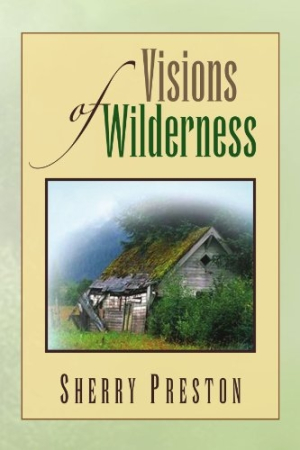Visions of Wilderness
The wilderness of Alaska has been an ongoing source of inspiration to the artistic community. This magical state’s austere beauty and rugged terrain attract both courageous adventurers and nature enthusiasts seeking solace. Unspoiled by commercial development, this precious, icy land has been the setting for works of fiction by unknown writers and literary icons like Jack London. The best can induce the sounds, scents, sights, and sensations of this intimidating rough country throughout its dramatic change of seasons.
Visions of Wilderness is a brief collection of poetry by newcomer Sherry Preston. She traveled to Alaska on one of the last steamships from Seattle that stopped along the ports in 1951. This book is a compilation of memories and reflections. Her goal is to share the spirit of this untouched environment with those who may not have savored the pleasure of raw earth not yet tainted by human demands. Preston lived near a native village for twelve years and learned from the people. They instilled in her a respect for Mother Nature, teaching her to hunt and fish as well as gather vegetables and medicines.
Preston is a visual poet skilled in capturing images much like a camera. She’s outstanding in her ability to evoke the feeling associated with a faraway place and a distant time. Sometimes she gives the reader a sense of strolling next to her on a midnight walk or gazing at the sea by her side on a summer night. Forced rhyming tends to detract from the quality of her work, however, leading to slight awkwardness and an occasional trivial tone that could have been avoided with free verse. At certain points she seems more concerned about syllabic pattern and precise rhyme than the originality of her descriptions.
The book’s greatest flaw is not in its delivery, but in its brevity; the collection contains only eighteen short verses. For a gifted poet with a probable wealth of material, the pamphlet-style presentation is a disappointment. Preston’s talent is evident, but there isn’t sufficient substance. What she has chosen to publish has considerable merit. Each piece stands on its own, preceded by a bit of background information, which enhances the reading experience and brings her impressions to vivid life.
Preston’s collection will appeal to anyone interested in preserving our natural heritage. With conservation and care, the rustic world captured by this poet can be kept alive for future generations to enjoy.
Reviewed by
Julia Ann Charpentier
Disclosure: This article is not an endorsement, but a review. The publisher of this book provided free copies of the book and paid a small fee to have their book reviewed by a professional reviewer. Foreword Reviews and Clarion Reviews make no guarantee that the publisher will receive a positive review. Foreword Magazine, Inc. is disclosing this in accordance with the Federal Trade Commission’s 16 CFR, Part 255.

